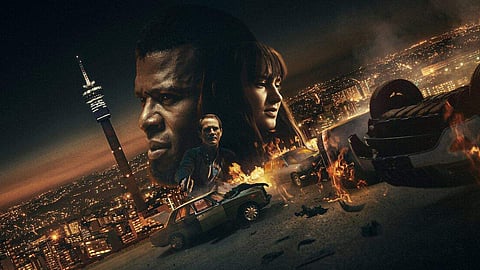Collision Series Review: The personal meets the political in a film that could have been executed better
Rating:(2.5 / 5)
The multilingual South African film, Collision, has a variety of characters in its midst, each loosely connected to the other. From the narrative’s intertwining personal tales, we see a complex country in transition, still coming to terms with its fractured Apartheid past. Anger and resentment are rife amongst the average black South African population, who believes it hasn’t yet received its rightful due. Crime and thievery are high, and according to one of the primary white corporate characters, “you know how it works here” (in reference to the bribes required to get things done). The streets of Johannesburg are as tough as any city out there, with gangs ruling the roost. A rising discontentment is witnessed in the working-class youth of these aforementioned streets. They believe their jobs are under threat owing to the illegal influx of foreigners – mainly Nigerians and Zimbabweans.
Director – Fabien Martorell
Cast – Langley Kirkwood, Zoey Sneedon, Siphesihle Vazi, Vuyo Dabula, Tessa Jubber, Mpho Sebeng
Streaming On – Netflix
At the heart of Collision is Johan (Langley Kirkwood), a white South African of Dutch origin, and his family - wife Diane (Tessa Jubber) and rebellious teenage daughter, Nicki (Zoey Sneedon). Johan works for an established company and is vying for the post of Chief Financial Officer after spending years in their tech department. The complicated dynamics of his sister-in-law boss and a black South African woman competing for the same post, set the tone for all the unravelling to come. His daughter Nicki acts out as she feels neglected by her self-involved parents. Skipping school and doing drugs with her rapper boyfriend, Cecil (Siphesihle Vazi) and his friend, Thando (Mpho Sebeng), both black South Africans, take her mind off an unwelcome trip to the US. Cecil and Thando are hustling for a living, with the latter attempting to push his friend into releasing his music to a larger audience. Notorious gangster, Bra Sol (Vuyo Dabula), combs the neighbourhoods spouting faux wisdom to kids and shopkeepers alike. He has a finger in many pies and plays the high-stakes game. His reputation has reached such heights that his aged mother has heard rumours of him murdering people. Then there’s a father-daughter duo who runs a store together. They are often at odds, the contentious subject of black immigrants and job opportunities in post-Apartheid South Africa, at the root of all arguments.
The plot, which fuses the personal and the political, does lend itself to decent storytelling. And while it often comes up with trumps concerning its central theme (that years of discrimination lead to warped power dynamics and crime, despite the outward appearance of equality), the execution leaves much room for improvement. The story coasts in several places and doesn’t resolve the varying conflicts at play in a manner befitting its workable premise. The poorly conceived title gives away too much in terms of the denouement, a denouement that ought to have been handled in a far superior way. The individual internal journeys of each primary character - be it Johan and his less-than-stellar value system or Nicki and her devil-may-care attitude or Bra Sol and his wavering conscience – keep you just about invested in it to see the credits roll. The events coming to a head or collision, if you will, is too predictable to ignore…and I’m not just speaking in terms of putting two and two together from the title. The political situation of a changing South Africa, with its inherent power structures pervading every facet of daily life, is another aspect that works in Collision’s favour. This messaging is clear and on point.
From the borderline racist and corrupt Johan feeling hard done by courtesy a black South African “usurping” his promotion in the name of “diversity” to Palesa’s (Samke Makhoba) father’s opinion that the Apartheid era was better than the current time (losing business to illegal black immigrants), it is clear that the country is yet to overcome its dark past. Had the writing been tighter, this could well have been an outstanding film. At the outset, and halfway through, Collision appeared to have things under control. Once it starts to fall away at that middle point, the film fails to recover. That being said, it cannot be deemed, by any stretch, an unwatchable creation. The long-term effects of racial discrimination, parent-child conflict, fear of the other, widespread criminality and shifting loyalties, all seem interesting subjects to explore. Maybe worth a watch for the foundation it is based on.

